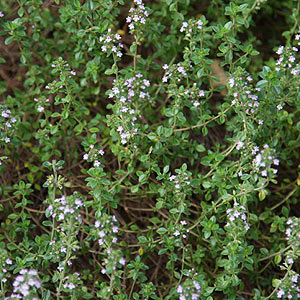
Thyme is widely used as a culinary herb. With over 300 species along with many hybrids and cultivars this is a varied group of plants.
Many are woody shrubs, however others are low growing ground cover plants.
Culinary varieties include Thymus vulgaris and well as the lemon scented thyme which is T x citriodorus.
Around 60 different varieties are used for either medicinal, cooking as well as for fragrance.
How to Grow Thyme Plants
With so many varieties it is difficult to generalise.
Most of the popular varieties are grown from cuttings and require a sunny position in a well drained soil.
Growing thyme plants from seed is difficult as this is plant that rarely produces seeds.
From cuttings, thyme can be planted out at any time of the year in warmer climates.
In cooler areas it is best planted in spring. An easy plant to grow in containers it forms an essential part of kitchen gardens.
Basic Care
- Chose a humus rich well drained soil.
- Plant young cuttings once they have established a good root system.
- Water well with a liquid seaweed fertiliser through the first summer.
- In colder climates, grow thyme in containers to overwinter in a sheltered position.
- Mulch around plants grown in the ground to protect them over winter.
Propagation
Propagation is easy by layering as well as by taking cuttings. Cuttings are best taken in spring.
Pests
Very few pests and diseases seem to worry thyme plants.
A major problem is over watering in poor drained soil as this can cause root rot.
Harvesting Thyme.
- Sprigs of fresh thyme can be picked at any time of the year to use in cooking.
- Thyme can also be harvested and dried for using through the year.
Culinary Thyme Varieties
- Thymus vulgaris – The most commonly used variety
- Thymus x citriodorus – Lemon scented variety
- Thymus herba-barona – Also known as ‘Caraway Thyme’
Medicinal Uses
Various species have been used for many year used as an antiseptic and well as an anti bacterial herb. Teas and infusions are made to treat coughs, colds and infections.
Landscaping Uses
Many varieties can be used for landscaping. Use thyme plants as low growing shrubs, or choose the low growing prostrate forms such as T. serpyllum as a ground cover plant.

